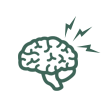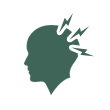Your Brain Injury Has Occurred
 Incurring a brain injury in Illinois can be a terrifying experience – especially when the outcome of your brain injury is unknown or the prognosis is grim. If you have sustained a traumatic brain injury, you may have questions about how your brain injury will:
Incurring a brain injury in Illinois can be a terrifying experience – especially when the outcome of your brain injury is unknown or the prognosis is grim. If you have sustained a traumatic brain injury, you may have questions about how your brain injury will:
- Affect your ability to return to work
- Engage in physical activity
- Continue living your life as you did prior to your accident.
If you are the family member of a person who has sustained a brain injury, you likely have worries about whether your loved one will recover, and if not, what life will look like moving forward.
Brain injury victims and their families should try to do as much research as possible understand in order to the journey that lies ahead. Knowing more will help when it comes to making decisions about medical treatment, at-home care and other important matters.
If the brain injury was caused by the negligence of another person, victims and their families may also be thinking about taking legal action in order to recover damages. They may have questions about what goes into a personal injury lawsuit and whether it is worth it.
What is a Traumatic Brain Injury?
 A traumatic brain injury, or TBI, is defined by the Centers for Disease Control and Prevention (CDC) as a “bump, blow or jolt to the head or a penetrating head injury that disrupts the normal function of the brain.” Traumatic brain injury can range in severity from mild (brief change in mental state or consciousness) to severe (extended duration of unconsciousness).
A traumatic brain injury, or TBI, is defined by the Centers for Disease Control and Prevention (CDC) as a “bump, blow or jolt to the head or a penetrating head injury that disrupts the normal function of the brain.” Traumatic brain injury can range in severity from mild (brief change in mental state or consciousness) to severe (extended duration of unconsciousness).
A traumatic brain injury can affect a person physically, cognitively and emotionally. The CDC states that TBI can impair:
- Thinking, memory, and reasoning
- Sensations such as touch, taste and smell
- Language and communication abilities
- Emotion, leading to anxiety, depression, anger and more.
A traumatic brain injury can be serious enough to render a person unable to care for himself or herself for the remainder of his or her life.
TBI severity is ranked using the Glasgow Coma Scale. Brainline.org reports that the Glasgow Coma Scale (GCS) measures the three following functions:
- Eye opening
- Verbal response
- Motor response.
The higher the number that is assigned on the GCS, the less severe the brain injury.
For example:
- A score of 6 for motor response indicates that the patient's motor responses are normal. A score of 1, however, indicates that the patient is demonstrating no motor responses whatsoever.
- A verbal response score of 4 indicates that the patient is having disoriented conversation. A verbal response score of 2, on the other hand, indicates that the patient is able to make sounds but is unable to form words.
Why Do Brain Injuries Occur?
 A head may be bumped, hit, jolted or penetrated during a variety of accident types. According to the CDC, falls are the leading cause of TBIs every year. They account for 40 percent of all traumatic brain injuries in the United States.
A head may be bumped, hit, jolted or penetrated during a variety of accident types. According to the CDC, falls are the leading cause of TBIs every year. They account for 40 percent of all traumatic brain injuries in the United States.
The second-leading cause of traumatic brain injuries is being hit by an object, or blunt trauma. Motor vehicle crashes are the third-leading cause of traumatic brain injuries, comprising 14 percent of all TBIs. The fourth leading cause of traumatic brain injuries in the U.S. is assault.
While the above may be the most common causes of traumatic brain injuries, they are not the only ones. A brain injury may also occur from an accident while playing sports, a motorcycle accident, a pedestrian or bike accident or from an oxygen deprivation accident such as a near-drowning experience. Shaking a baby violently can also cause a traumatic brain injury, known as “shaken baby syndrome” when referring to infants.
What Are Signs of a Brain Injury?
The signs and symptoms of a TBI can vary greatly depending on whether a brain injury is mild, moderate or severe. The following are physical, sensory and cognitive symptoms to pay attention to:
Mild to Moderate
Usually, one of the first signs of a mild to moderate brain injury, according to the Mayo Clinic, is the loss of consciousness for a brief moment or a few seconds. If loss of consciousness does not occur, then the victim may report feeling dazed or may appear to be confused or disoriented. Other physical symptoms are:
In addition to physical symptoms, a victim and his or her family should also stay on the lookout for sensory and mental signs of a brain injury, too. These include:
Moderate to Severe Brain Injury Signs
Many moderate to severe brain injuries will share the same symptoms of mild to moderate brain injuries. However, the more serious the brain injury type, the more developed and prolonged are the symptoms.
For example, rather than losing consciousness for a few seconds, a moderate to severe brain injury may be characterized by a loss of consciousness of a few minutes or even a few hours. Further, rather than mild nausea, a person suffering from a severe TBI may experience uncontrollable vomiting.
Other symptoms of a more serious brain injury are:
The mental and sensory complications of a more serious traumatic brain injury are also more pronounced. Confusion may be profound, and a TBI victim may be unable to speak lucidly and form sentences and may slur speech.
A severe form of TBI may also render the victim unable to remember important details about the accident or about himself or herself such as his or her name or the day of the week. The person may also demonstrate extreme aggressiveness or agitation and may fall into a coma that persists for an extended duration of time.
Signs of a TBI in a Child
Children may respond to a traumatic brain injury differently than adults do. In addition to the symptoms above, a child may also experience mood or behavior changes after experiencing a blow or hit to the head. These may include changes in eating or sleeping habits, acting depressed, crying uncontrollably and losing interest in once-loved activities or toys.
When Should You Get Medical Treatment for a Brain Injury?
Knowing when to seek medical care for a brain injury is not always straightforward. Too often, people fail to seek medical care because they believe their symptoms to be minor – only to have the TBI advance to a more dangerous state.
It is important to seek medical treatment anytime that:
- A blow, jolt or penetration to the head occurs, and
- Physical, cognitive or behavioral changes are observed.
Even if you do not believe the injury to be serious, getting medical help from an emergency room medic, family doctor or a specialist could be critical to your outcome.
In fact, failing to seek treatment for TBI can be devastating. A brain injury can lead to fluid buildup and swelling in the brain that, if not quickly remedied, can lead to permanent brain damage.
A brain injury may also lead to an infection (if the head was cut or torn during the accident). The infection can enter the brain and even spread to the rest of the body's nervous system. Other risks of brain injuries that go untreated include:
- Altered consciousness, including going into a coma or vegetative state
- Brain death
- Seizures
- Damage to the brain's blood vessels, leading to blood clots or stroke
- Damage to nerves within the brain, leading to loss of vision, partial or total facial paralysis, loss of sensation and more
- Intellectual problems
- Cognitive problems
- Behavior and emotional changes
- An increased risk for degenerative brain diseases, including Alzheimer's disease, dementia and chronic traumatic encephalopathy (CTE).
To reduce your risk of suffering the traumatic side effects of a brain injury listed above, it is best to seek medical care as soon as possible after being struck in the head. While prompt treatment of TBI cannot reverse damage or prevent further damage in all cases, it does improve your chances of a more positive prognosis.
When Should You Get Help from a Lawyer?
Traumatic brain injury can leave you feeling physically devastated and emotionally drained. The prospect of hiring an attorney after a traumatic brain injury may seem to be intimidating, exhausting or even unnecessary.
However, in many cases, contacting an attorney can significantly improve your chances of recovering the compensation that you need to pay for your injury and improve your quality of life moving forward.
You should consider getting help from a lawyer if your brain injury would not have occurred but for the negligence of another person. Negligence refers to the failure to exercise the proper duty of care demanded by a current situation.
For example, if your brain injury was incurred during a car accident caused by a drunk driver, the drunk driver acted negligently by failing to operate his or car while sober and in compliance with the law. Or, if your traumatic brain injury was caused when you slipped and fell on a property with broken stair and no handrail, the property owner may be considered negligent for failing to maintain his or her property in a safe and hazard-free condition.
When negligence was the cause of your brain injury, a brain injury lawyer can provide you with legal guidance and services that include:
- Conducting a thorough investigation into the cause of your injury
- Helping to you to identify the at-fault party
- Gathering evidence on your behalf
- Compiling medical data to demonstrate the extent of your harm
- Recruiting expert witnesses who can testify on your behalf
- Filing your claim in full and on time
- Determining the amount of damages that you have suffered
- Negotiating for a fair settlement amount
- Taking your case to court if necessary.
An attorney is also responsible for advocating for your rights during every step of the process. If you have any legal questions, an attorney can provide you with the answers. Your attorney can also help you to explore different avenues of compensation after incurring a brain injury, the types of damages that you and your family may be entitled to receive and the benefits and disadvantages of filing a personal injury action.
Most attorneys work on a contingency fee basis. This means that you do not have to pay the attorney up front and will not owe your attorney any money unless your case is successful.













